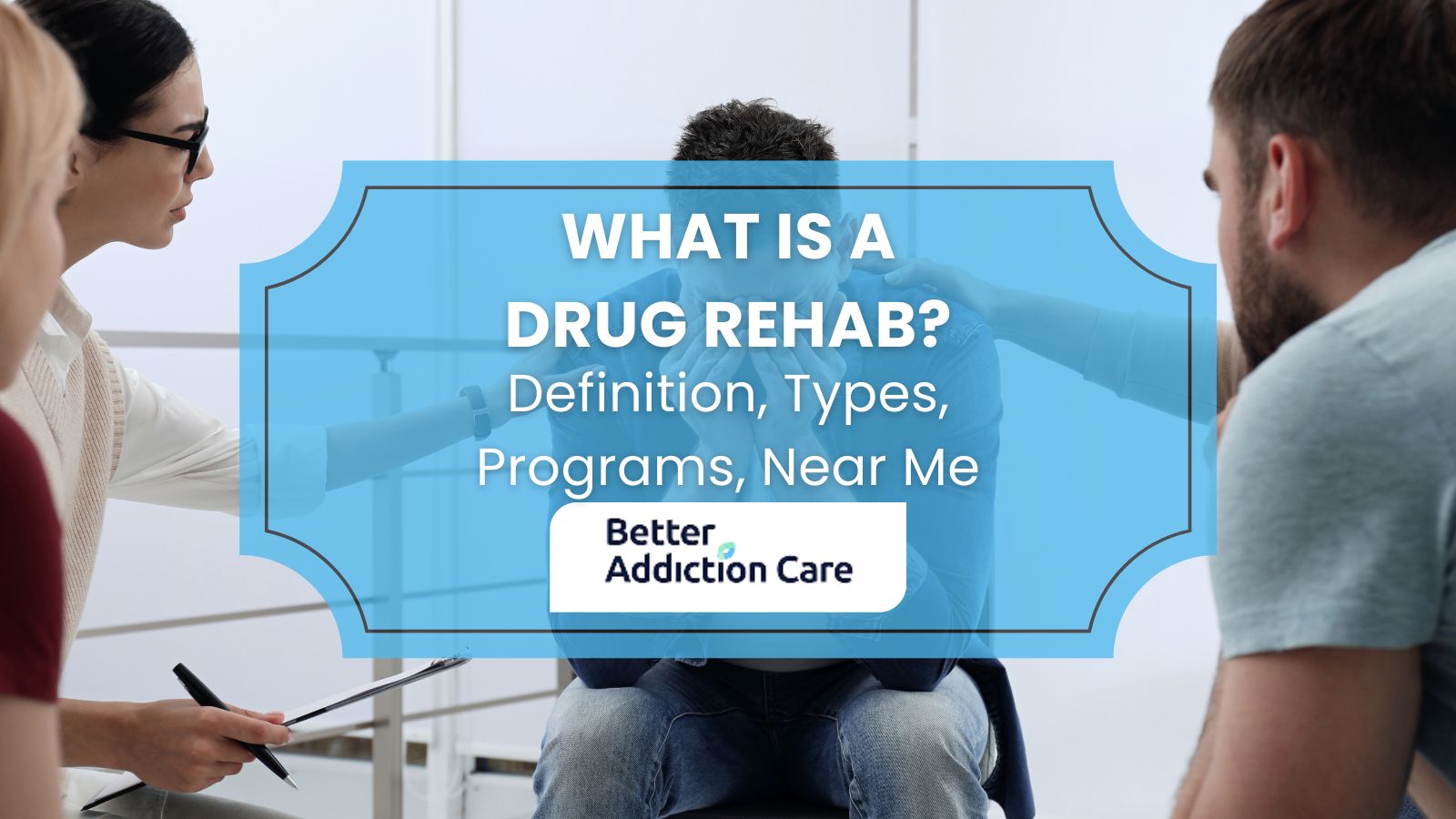128 Best Alcohol and Drug Rehabs in Virginia 2025
Individuals seeking addiction recovery in Virginia have access to 128+ drug rehab centers offering comprehensive treatment options. Our directory features a diverse selection of inpatient and outpatient facilities, detox centers, and medication-assisted treatment (MAT) programs to support lasting recovery.
Explore various rehab options, compare services, and find a facility that meets your specific needs. Whether you need medical detox, evidence-based therapy, or a long-term recovery plan, this resource connects you with reputable providers in Virginia.
128 Treatment Centers in Virginia, US
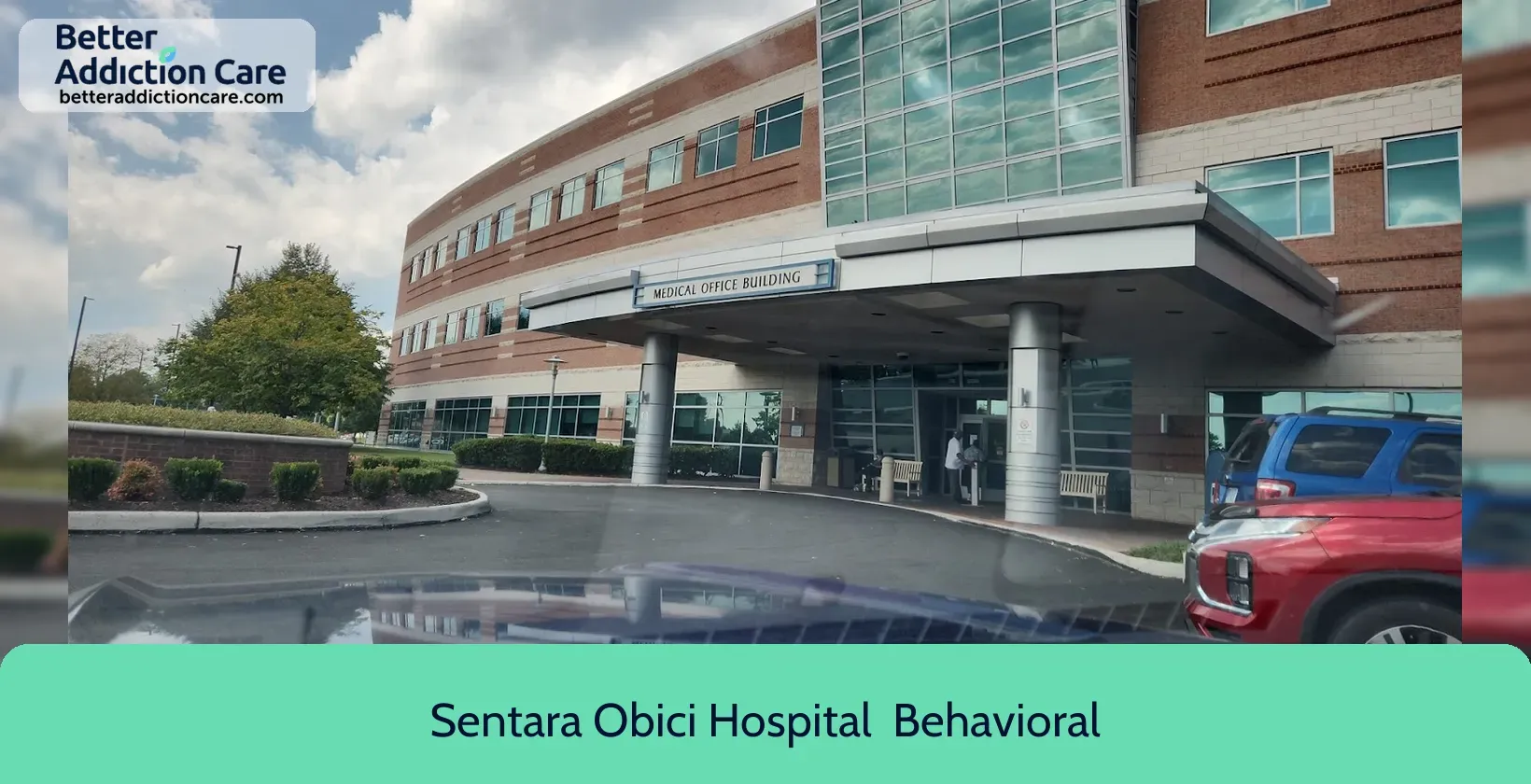
6.86

7.55

7.37

7.09

6.95

7.28

7.00

7.43

7.60

7.86

6.79

6.98

6.82

7.08
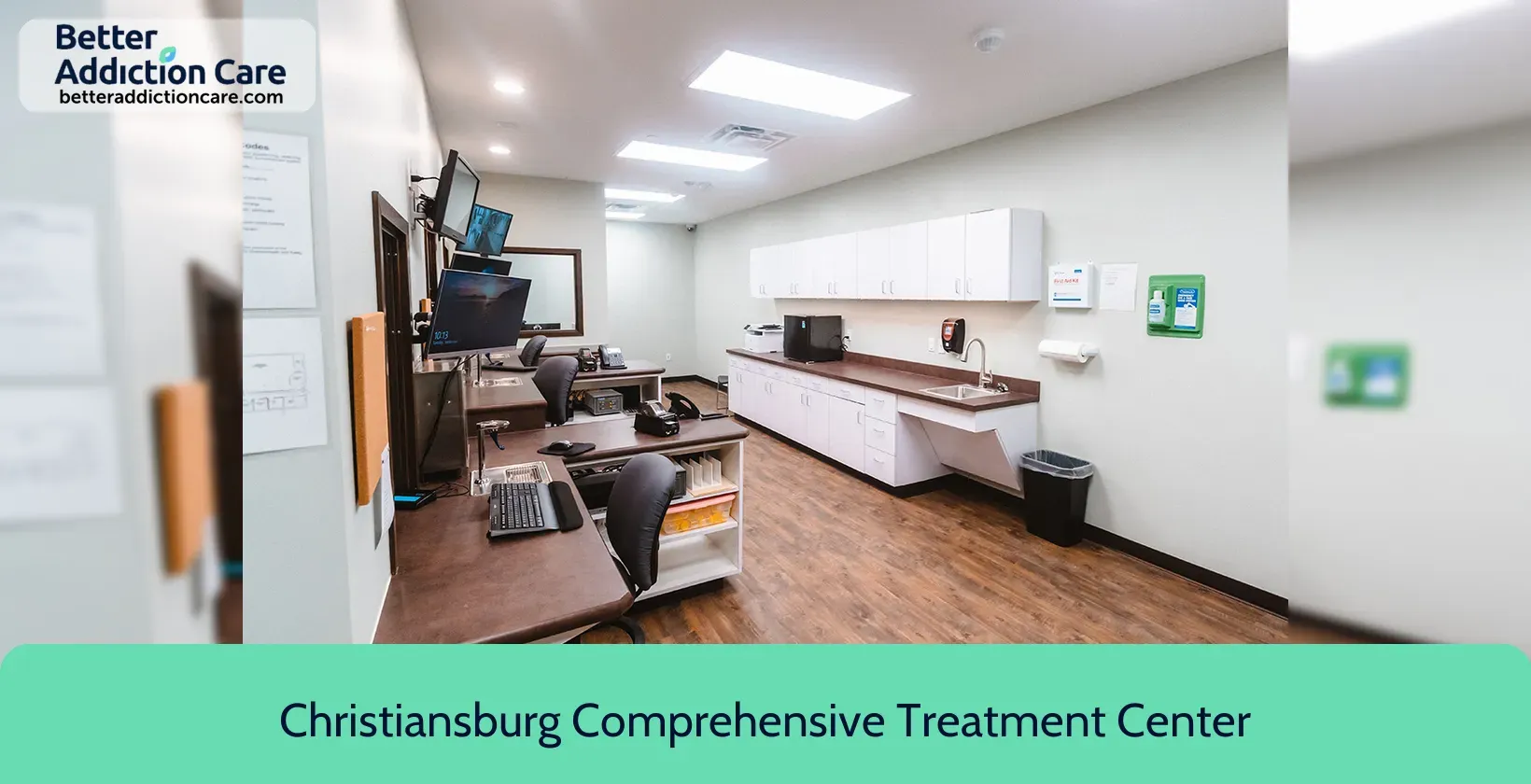
7.36

7.39

6.71

6.65
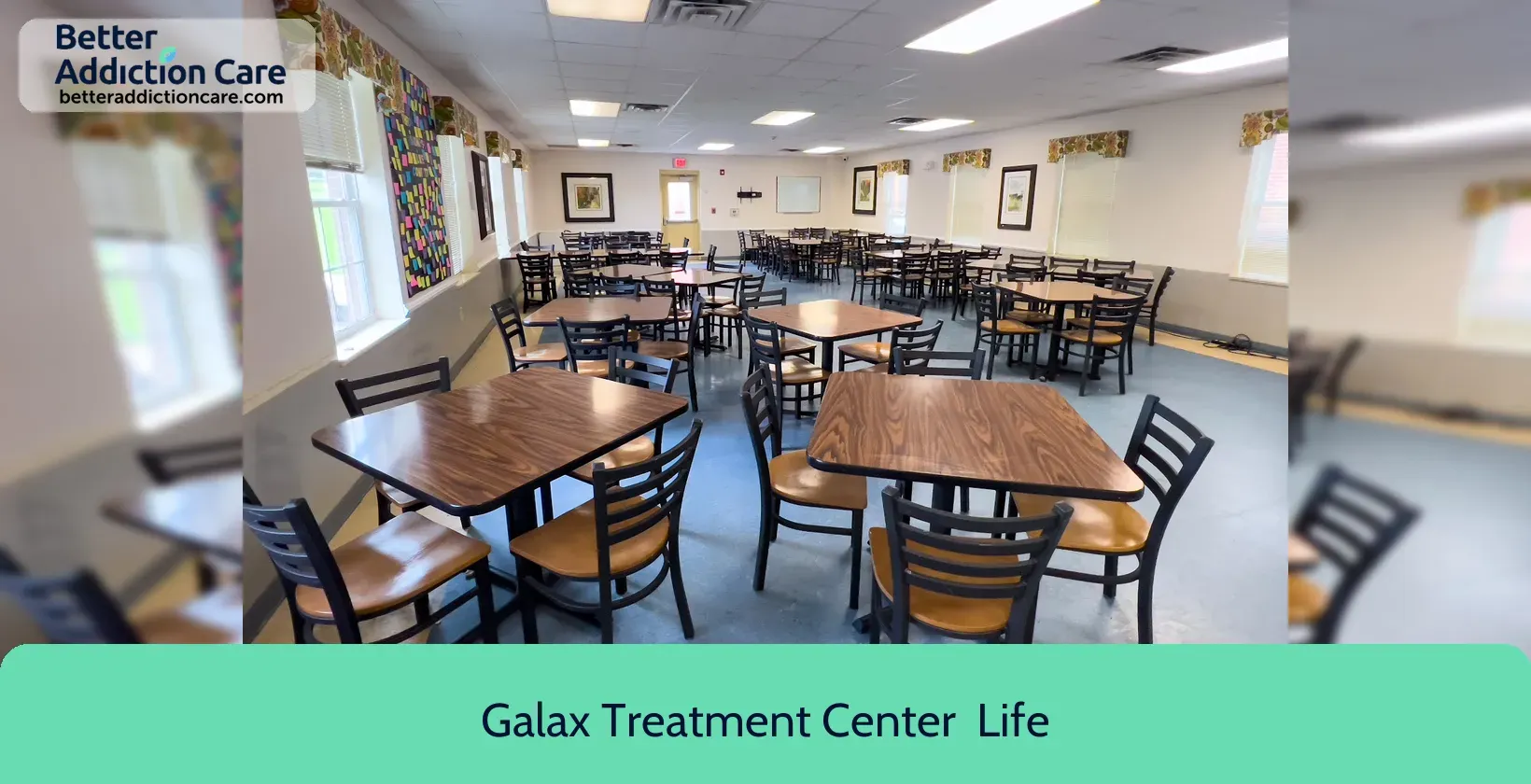
7.49

6.80

6.83

7.34

6.56

6.68
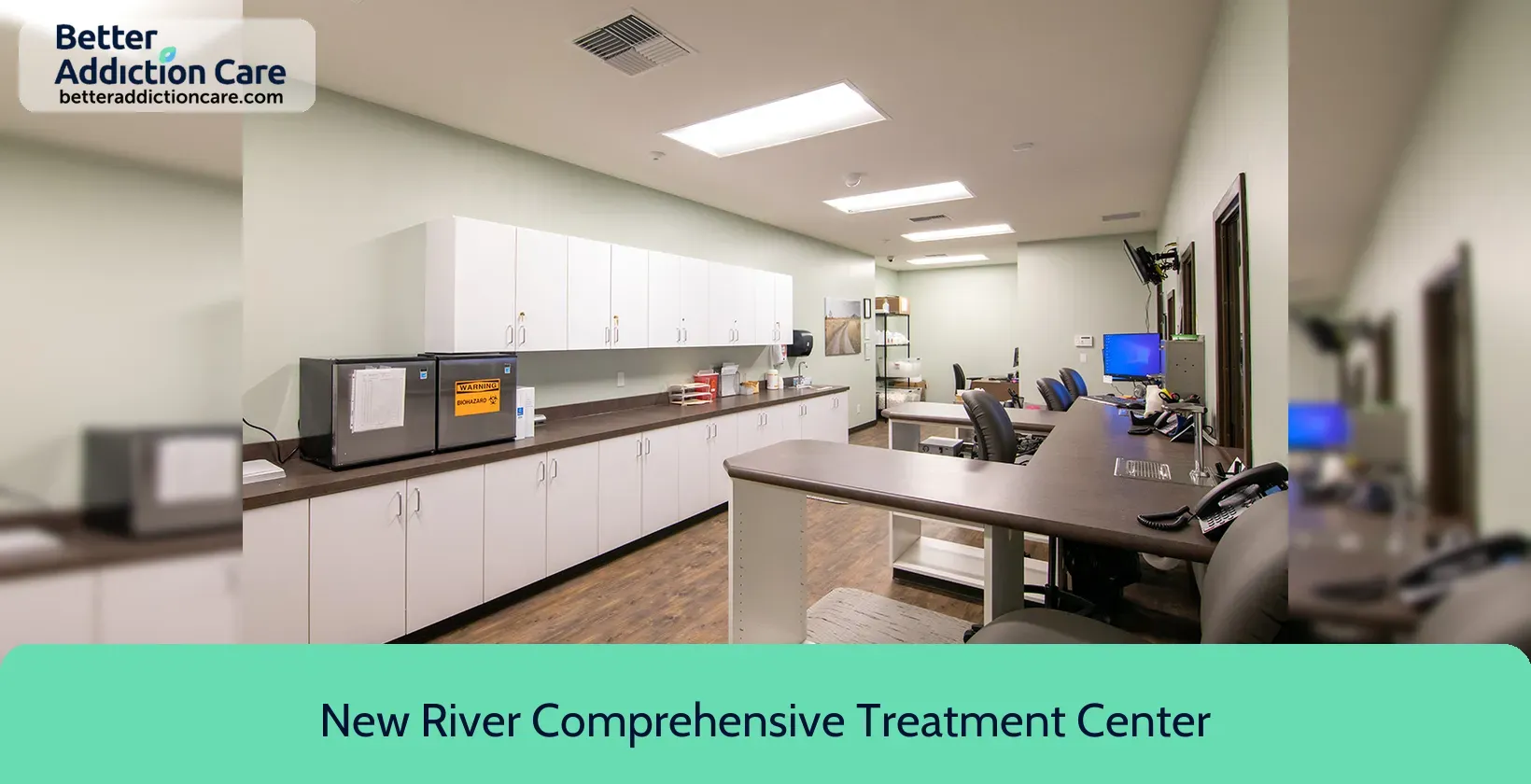
7.40

6.86

6.77

7.48

6.84

6.65

6.97

6.56

6.53

7.31

6.59

6.56

6.68

7.25

7.19
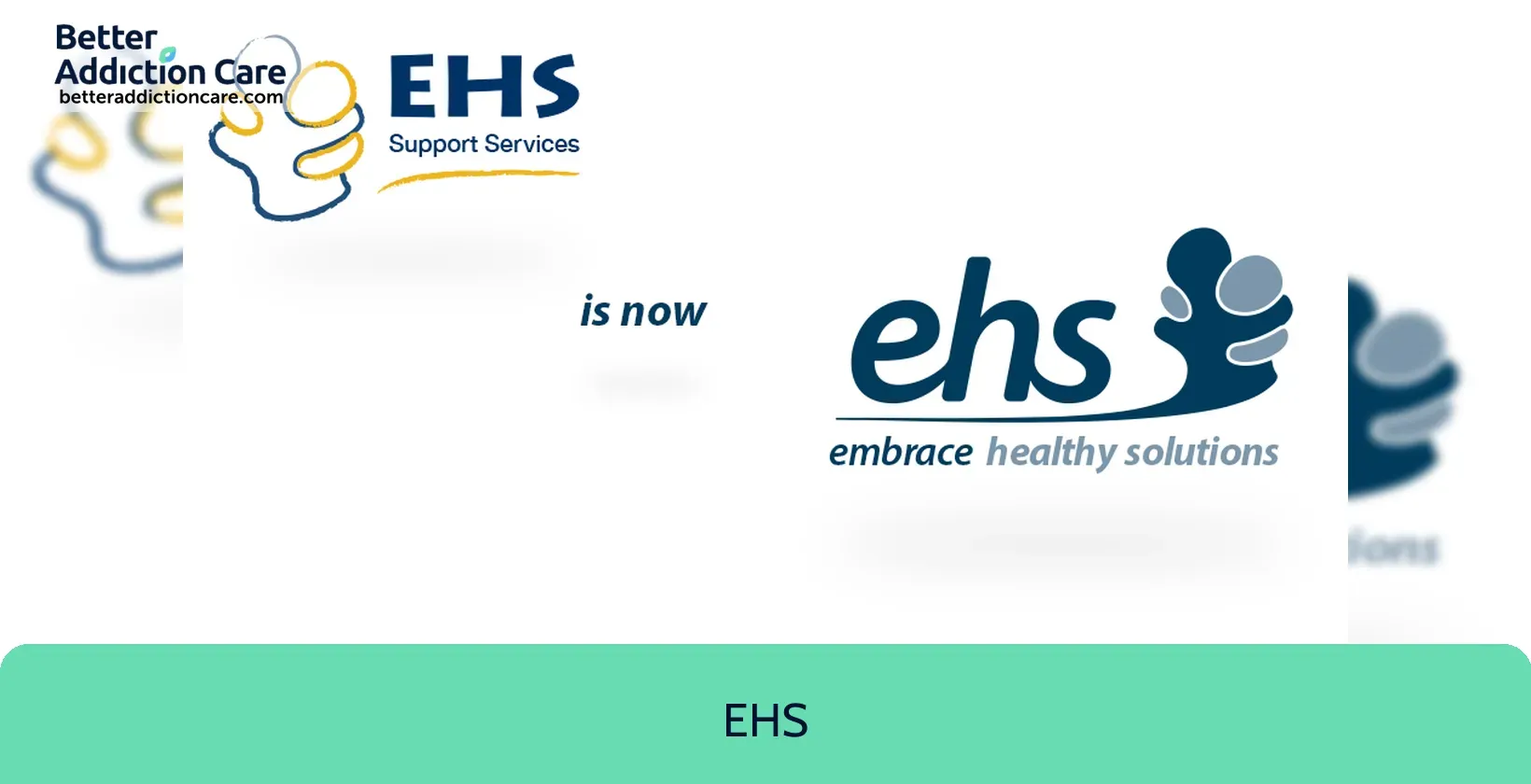
6.68

6.71

6.59
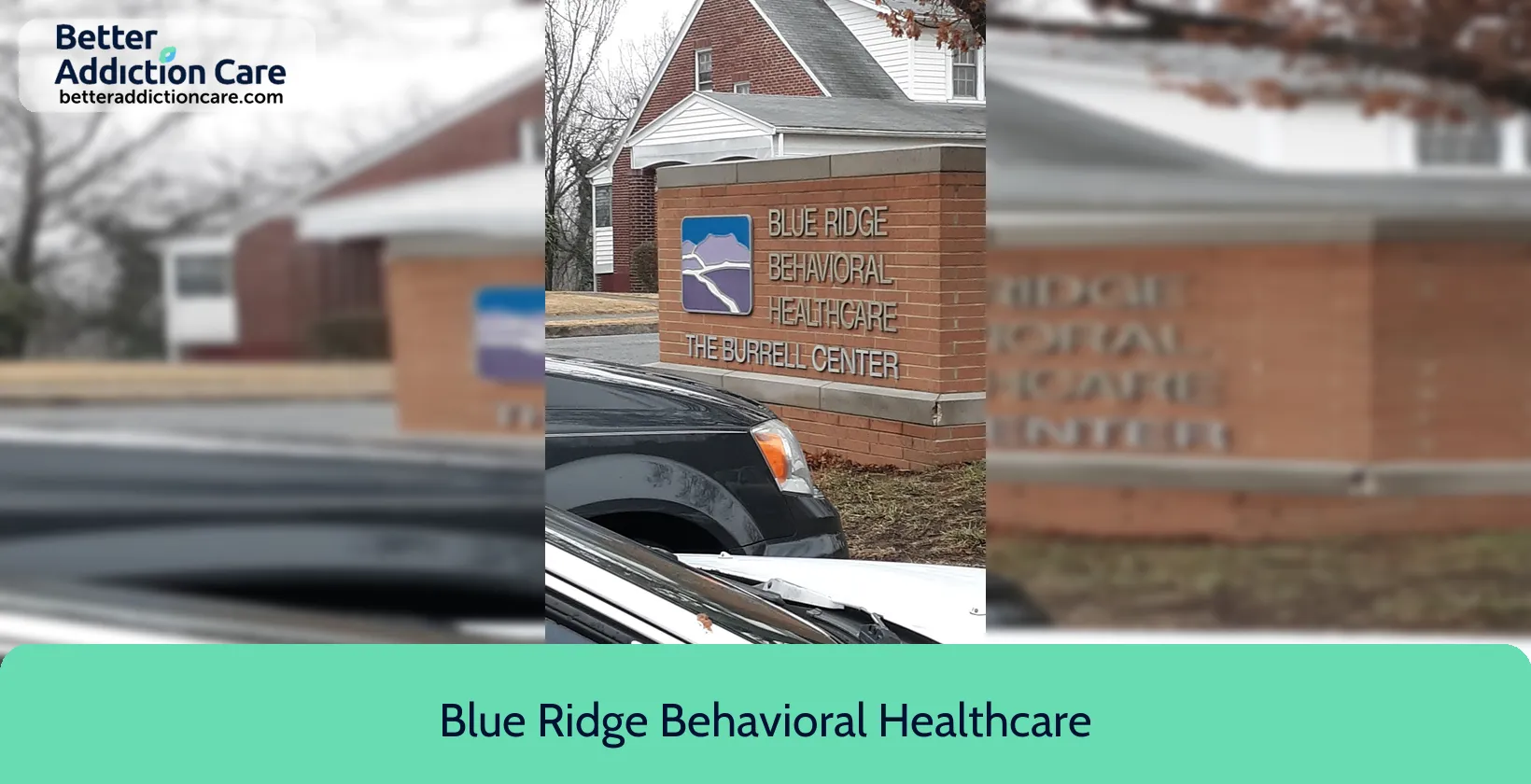
7.92
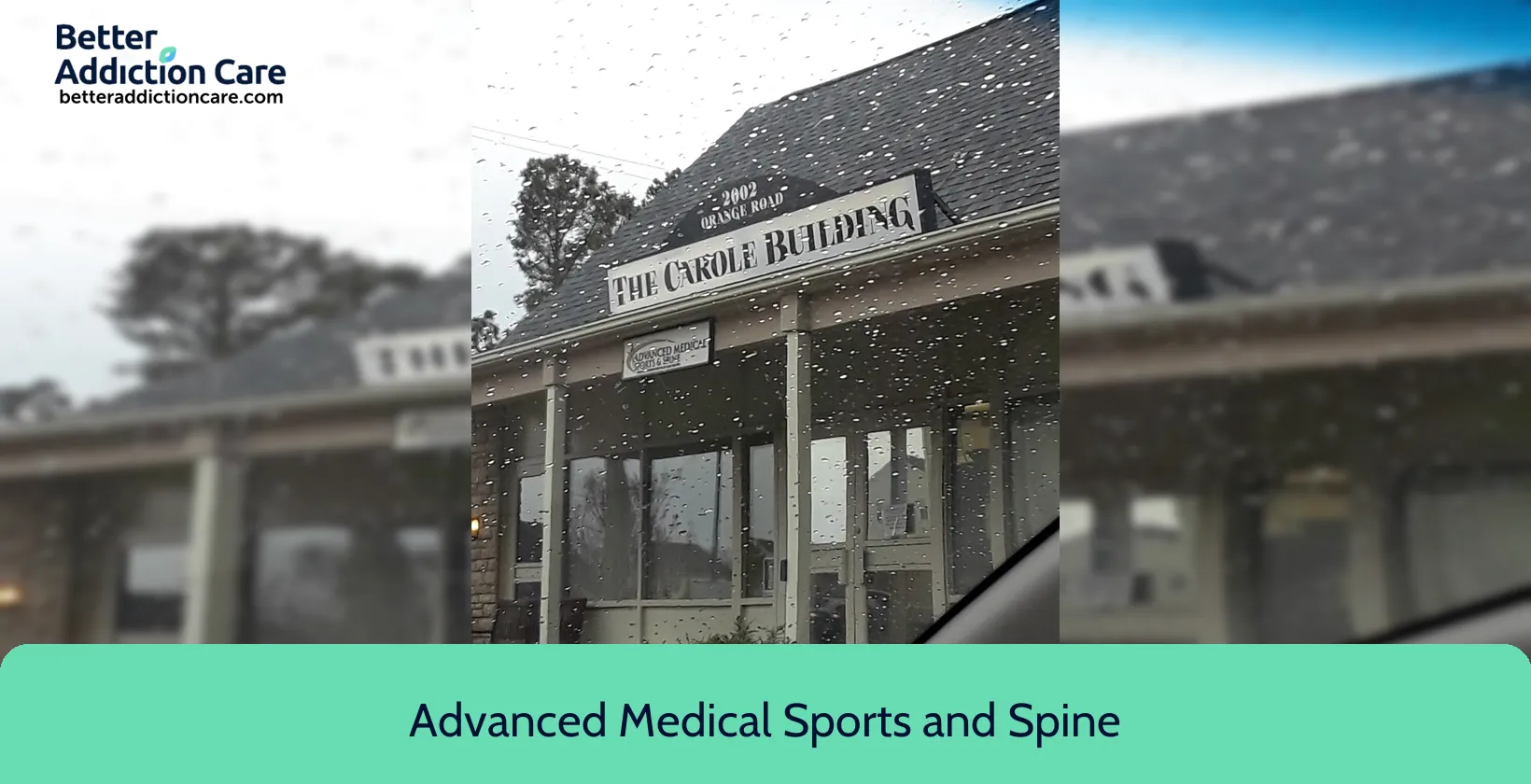
6.82
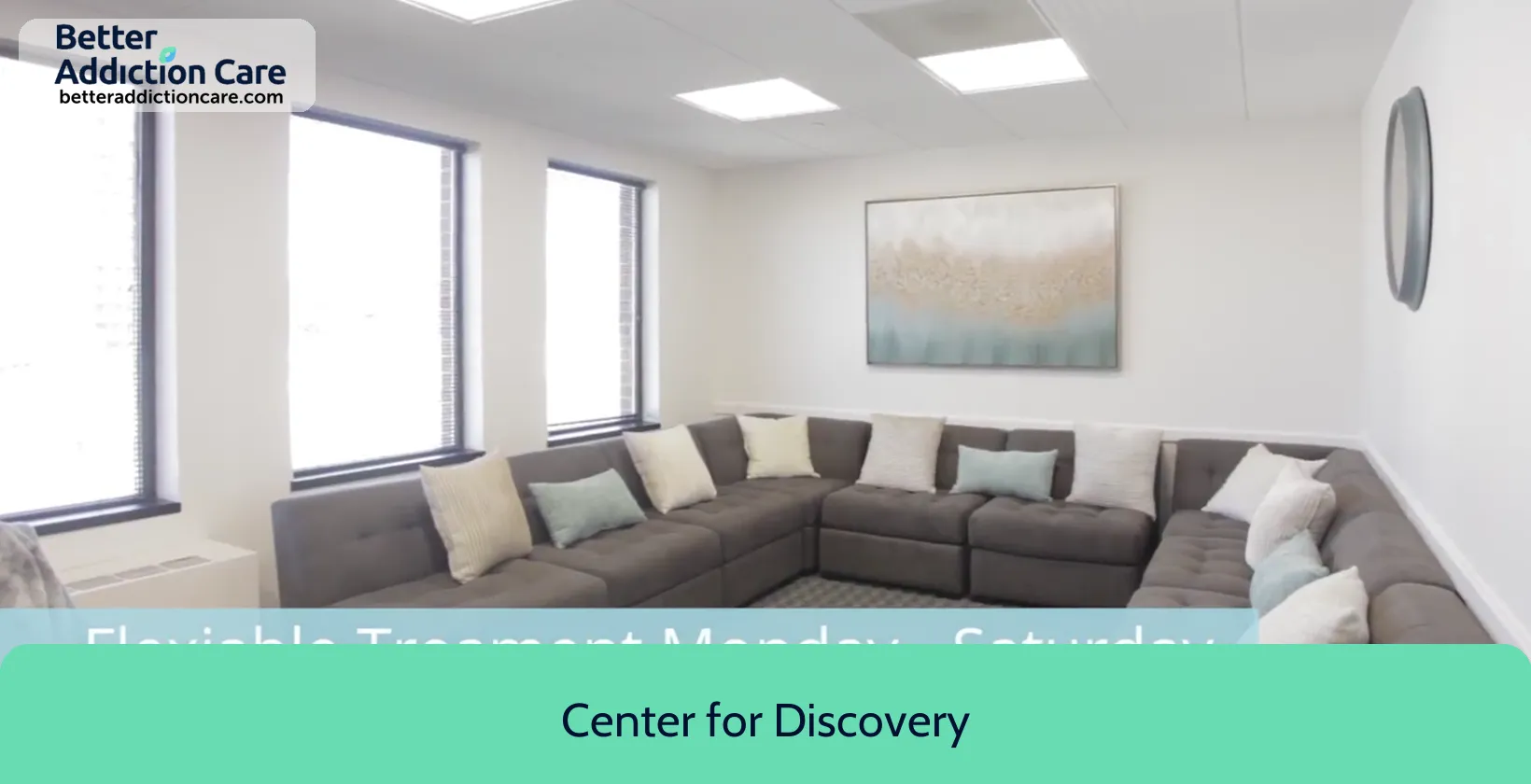
6.79
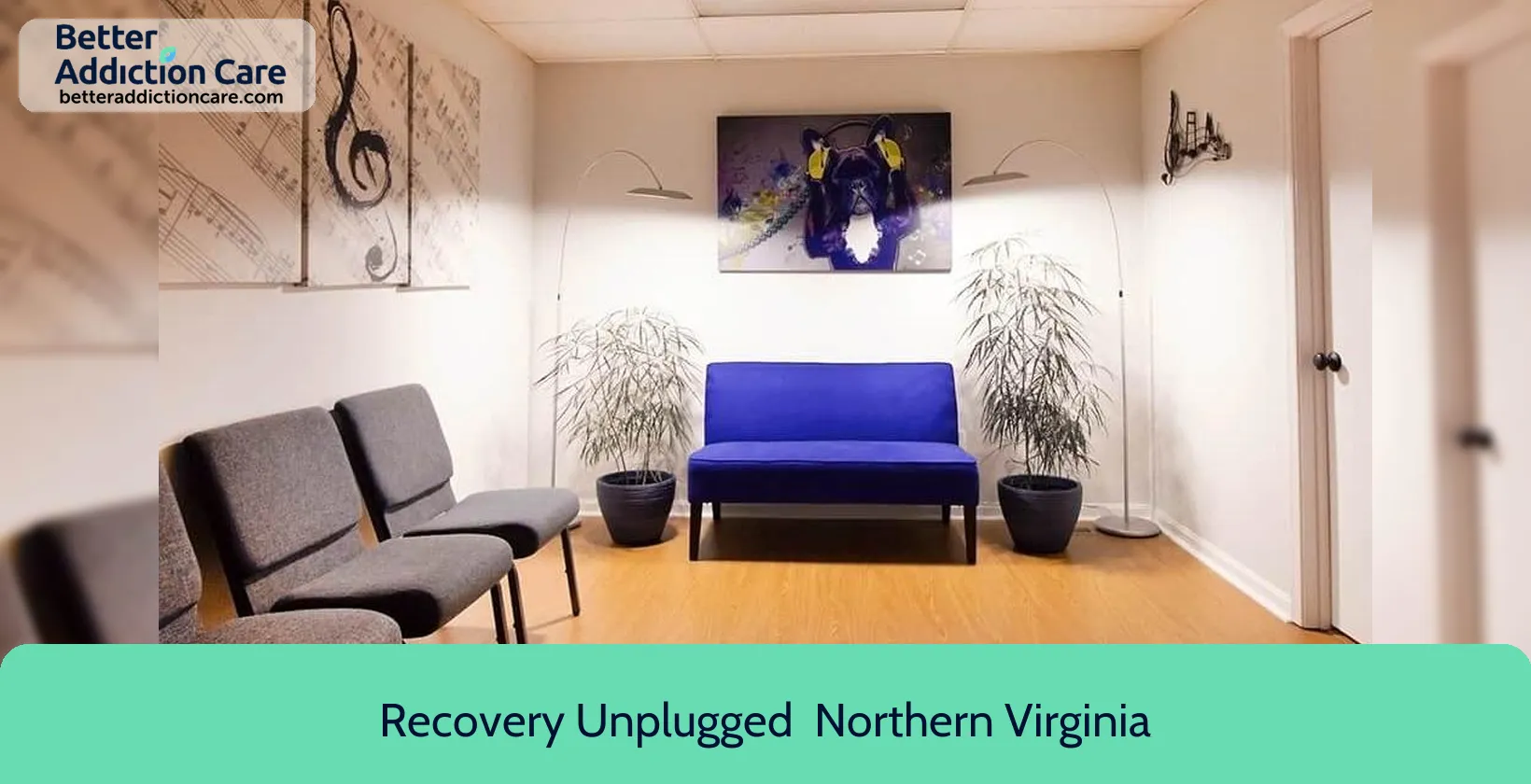
7.31

6.65
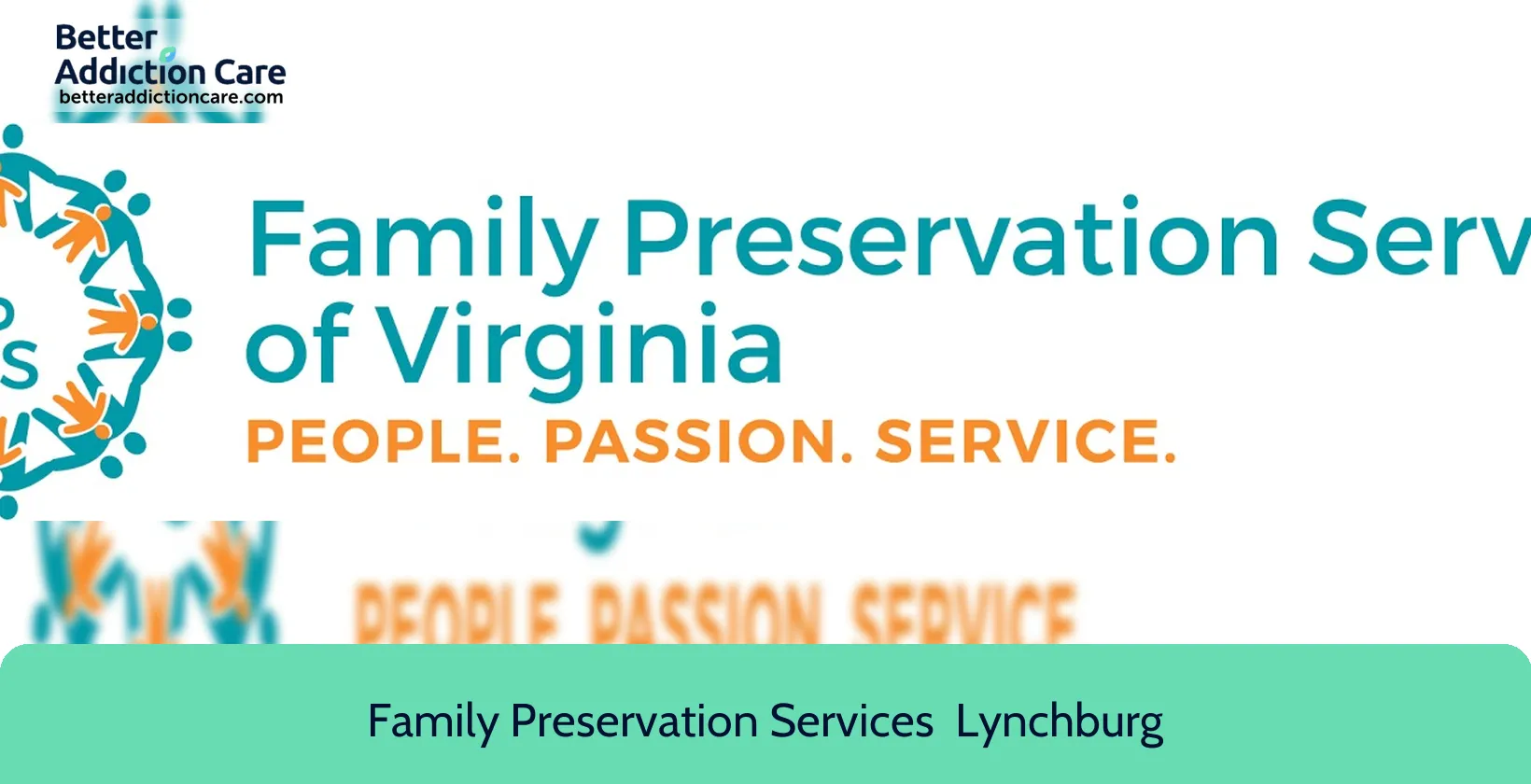
6.68

6.68
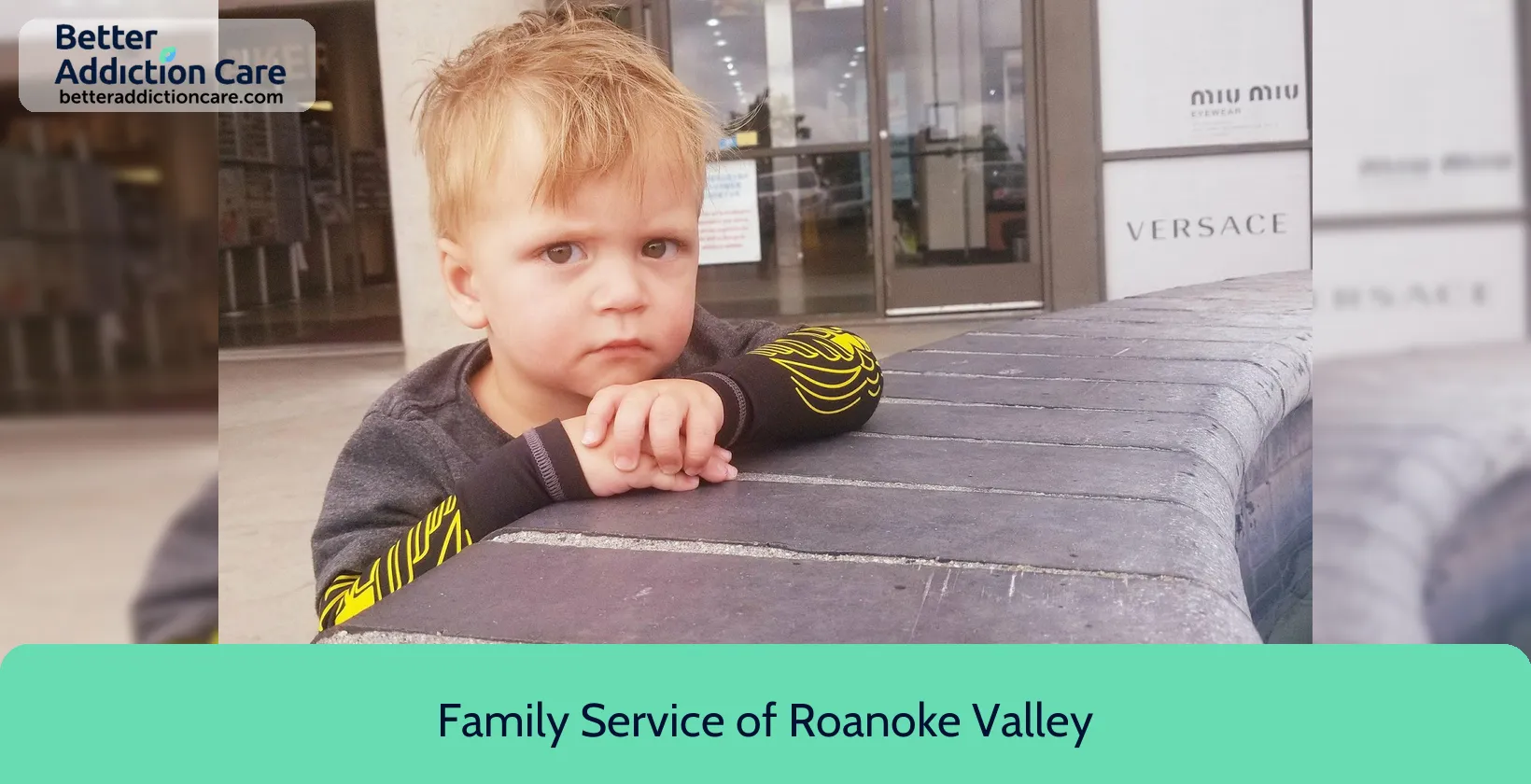
6.62
Substance abuse and Mental Health facilities Report for Virginia
12th
Cheapest To Most Expensive State Rank
279
Substance Abuse Facilities
25,609
Number of Patients Annually
24,388
Annual Enrollments
$41M
Spent on Outpatient Services (Million)
$1,705.00
Avg Outpatient Rehab Cost
1,048
Residential Admissions
$59M
Spent on Residential Treatment (Million)
$56,456.00
Residential Rehab Pay (Up To)
173
Total Patients
4
Free Drug Rehab Facilities
Alcoholism, Drug Abuse, Mental Health, and Treatment in Virginia
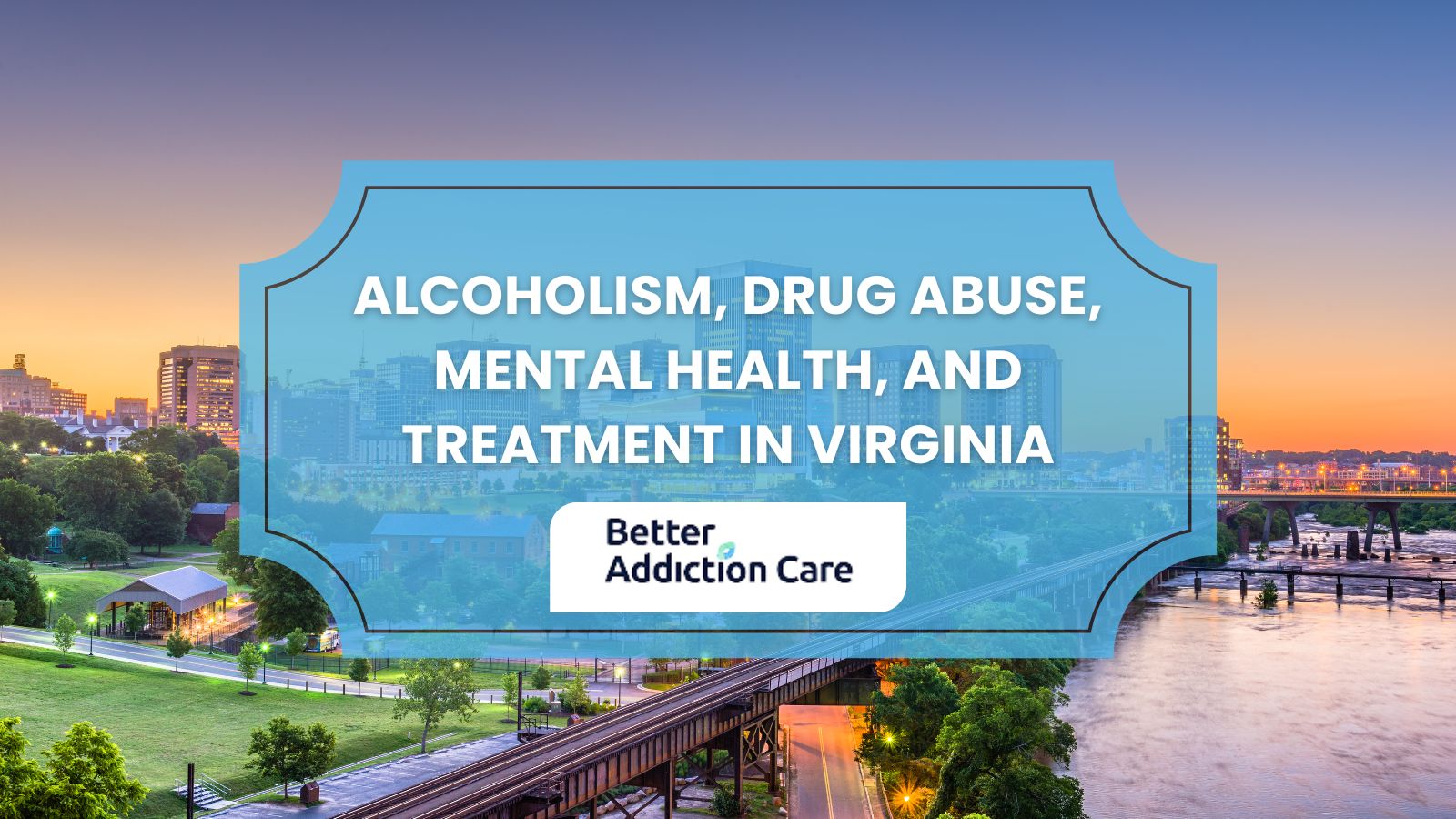
What are the main addictions people in Virginia suffer from?
The main addictions people in Virginia suffer from include;
- Alcohol Addiction: 738,000 individuals aged 12 and older have alcohol addiction, equating to 10.3% of the population. 480,000 (65%) males are higher in number as compared to 258,000 (35%) females.
- Tobacco Addiction: 1,040,000 individuals aged 12 and older have tobacco addiction, equating to 14.6% of the population. 624,000 (60%) males are higher in number as compared to 416,000 (40%) females.
- Marijuana Addiction: 959,000 individuals aged 12 and older have marijuana addiction, equating to 13.5% of the population. 670,000 (70%) males are higher in number as compared to 289,000 (30%) females.
- Prescription Pain Reliever Addiction: 210,000 individuals aged 12 and older have prescription pain reliever addiction, equating to 2.9% of the population. 105,000 (50%) males are higher in number as compared to 105,000 (50%) females
- Cocaine Addiction: 142,000 individuals aged 12 and older have cocaine addiction, equating to 2.0% of the population. 99,400 (70%) females are higher in number as compared to 42,600 (30%) females.
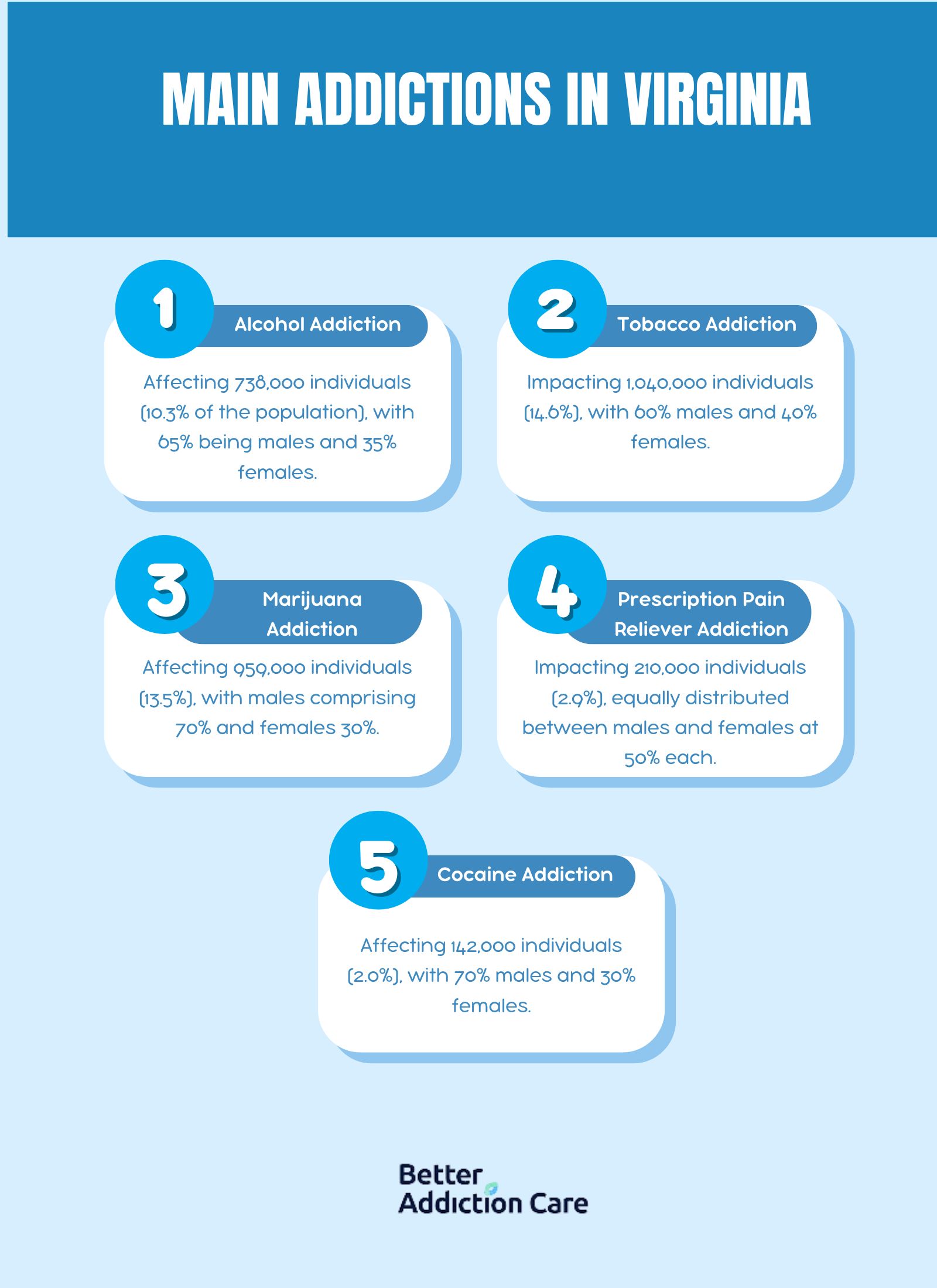
What is the cost of rehab centers in Virginia?
The cost of rehab centers in Virginia is $56,456 without insurance. A 30-day inpatient program averages $18,492, while outpatient programs are more affordable at $1,710 for the same duration. Costs of rehab centers vary significantly based on the type of addiction and the required treatment. For example, medical detoxification, essential for substances like alcohol or opioids, is one of the most expensive options, averaging $139,185. Long-term inpatient rehab for severe addictions costs $49,819. The type of rehab center also influences costs.
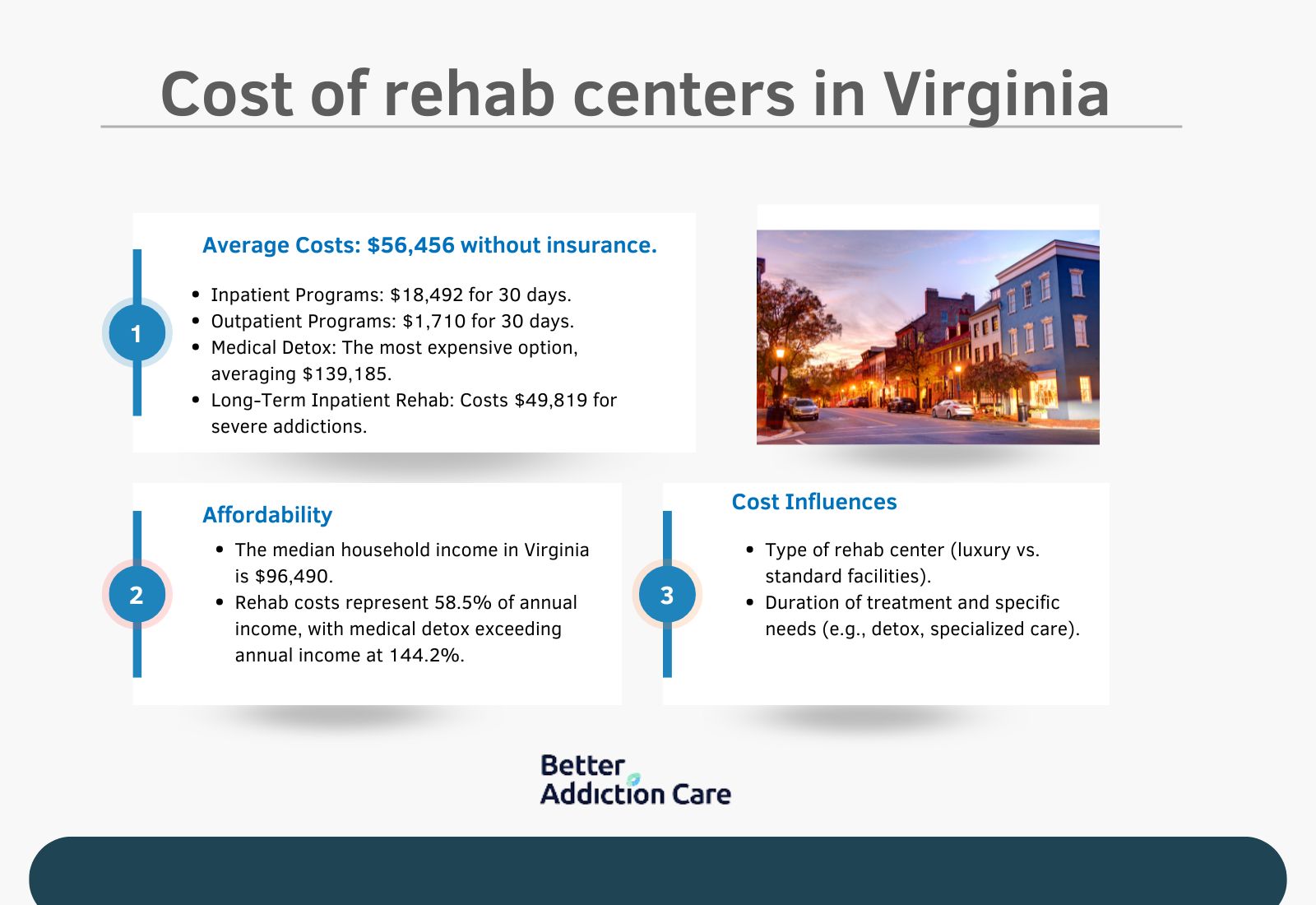
Virginia's median household income is $96,490, the cost of rehab centers in Virginia represents 58.5% of annual income. Medical detox costs are particularly high, equating to 144.2% of the median household income, while long-term inpatient rehab consumes 51.6%. These figures highlight that addiction treatment is prohibitively expensive for many residents without insurance or financial aid. Costs also vary depending on the type of rehab center, with luxury or private facilities charging more than standard treatment centers.
What is the cost of LGBTQ+ rehab centers in Virginia?
The cost of LGBTQ+ rehab centers in Virginia is $56,000 without insurance. A 30-day inpatient program averages $18,492, while outpatient programs are more affordable at $1,710 for the same duration. Costs of LGBTQ+ rehab centers vary significantly based on the type of addiction and the required treatment. For example, medical detoxification, essential for substances like alcohol or opioids, is one of the most expensive options, averaging $139,185. Long-term inpatient rehab for severe addictions costs $49,819. The type of rehab center also influences costs of LGBTQ+ rehab centers.
Virginia's median household income is $96,490, the cost of LGBTQ+ rehab centers in Virginia represents 58% of annual income. Medical detox costs are particularly high, equating to 144.2% of the median household income, while long-term inpatient rehab consumes 51.6%. These figures highlight that addiction treatment is prohibitively expensive for many residents without insurance or financial aid. Costs of LGBTQ+ rehab centers also vary depending on the type of rehab center, with luxury or private facilities charging more than standard treatment centers.
What is the cost of Faith-Based rehab centers in Virginia?
The cost of Faith-Based rehab centers in Virginia is $55,900 without insurance. A 30-day inpatient program averages $18,492, while outpatient programs are more affordable at $1,710 for the same duration. Costs of Faith-Based rehab centers vary significantly based on the type of addiction and the required treatment. For example, medical detoxification, essential for substances like alcohol or opioids, is one of the most expensive options, averaging $139,185. Long-term inpatient rehab for severe addictions costs $49,819. The type of rehab center also influences costs of Faith-Based rehab centers.
Virginia's median household income is $96,490, the cost of Faith-Based rehab centers in Virginia represents 57.9% of annual income. Medical detox costs are particularly high, equating to 144.2% of the median household income, while long-term inpatient rehab consumes 51.6%. These figures highlight that addiction treatment is prohibitively expensive for many residents without insurance or financial aid. Costs of Faith-Based rehab centers also vary depending on the type of rehab center, with luxury or private facilities charging more than standard treatment centers.
What is the cost of Men-Only rehab centers in Virginia?
The cost of Men-Only rehab centers in Virginia is $55,500 without insurance. A 30-day inpatient program averages $18,492, while outpatient programs are more affordable at $1,710 for the same duration. Costs of Men-Only rehab centers vary significantly based on the type of addiction and the required treatment. For example, medical detoxification, essential for substances like alcohol or opioids, is one of the most expensive options, averaging $139,185. Long-term inpatient rehab for severe addictions costs $49,819. The type of rehab center also influences costs of Men-Only rehab centers.
Virginia's median household income is $96,490, the cost of Men-Only rehab centers in Virginia represents 57.5% of annual income. Medical detox costs are particularly high, equating to 144.2% of the median household income, while long-term inpatient rehab consumes 51.6%. These figures highlight that addiction treatment is prohibitively expensive for many residents without insurance or financial aid. Costs of Men-Only rehab centers also vary depending on the type of rehab center, with luxury or private facilities charging more than standard treatment centers.
What is the cost of Women-Only rehab centers in Virginia?
The cost of Women-Only rehab centers in Virginia is $55,000 without insurance. A 30-day inpatient program averages $18,492, while outpatient programs are more affordable at $1,710 for the same duration. Costs of Women-Only rehab centers vary significantly based on the type of addiction and the required treatment. For example, medical detoxification, essential for substances like alcohol or opioids, is one of the most expensive options, averaging $139,185. Long-term inpatient rehab for severe addictions costs $49,819. The type of rehab center also influences costs of Women-Only rehab centers.
Virginia's median household income is $96,490, the cost of Women-Only rehab centers in Virginia represents 57% of annual income. Medical detox costs are particularly high, equating to 144.2% of the median household income, while long-term inpatient rehab consumes 51.6%. These figures highlight that addiction treatment is prohibitively expensive for many residents without insurance or financial aid. Costs of Women-Only rehab centers also vary depending on the type of rehab center, with luxury or private facilities charging more than standard treatment centers.
What is the cost of Teen rehab centers in Virginia?
The cost of Teen rehab centers in Virginia is $54,000 without insurance. A 30-day inpatient program averages $18,492, while outpatient programs are more affordable at $1,710 for the same duration. Costs of Teen rehab centers vary significantly based on the type of addiction and the required treatment. For example, medical detoxification, essential for substances like alcohol or opioids, is one of the most expensive options, averaging $139,185. Long-term inpatient rehab for severe addictions costs $49,819. The type of rehab center also influences costs of Teen rehab centers.
Virginia's median household income is $96,490, the cost of Teen rehab centers in Virginia represents 55.9% of annual income. Medical detox costs are particularly high, equating to 144.2% of the median household income, while long-term inpatient rehab consumes 51.6%. These figures highlight that addiction treatment is prohibitively expensive for many residents without insurance or financial aid. Costs of Teen rehab centers also vary depending on the type of rehab center, with luxury or private facilities charging more than standard treatment centers.
What is the cost of Young Adult rehab centers in Virginia?
The cost of Young Adult rehab centers in Virginia is $53,500 without insurance. A 30-day inpatient program averages $18,492, while outpatient programs are more affordable at $1,710 for the same duration. Costs of Young Adult rehab centers vary significantly based on the type of addiction and the required treatment. For example, medical detoxification, essential for substances like alcohol or opioids, is one of the most expensive options, averaging $139,185. Long-term inpatient rehab for severe addictions costs $49,819. The type of rehab center also influences costs of Young Adult rehab centers.
Virginia's median household income is $96,490, the cost of Young Adult rehab centers in Virginia represents 55.4% of annual income. Medical detox costs are particularly high, equating to 144.2% of the median household income, while long-term inpatient rehab consumes 51.6%. These figures highlight that addiction treatment is prohibitively expensive for many residents without insurance or financial aid. Costs of Young Adult rehab centers also vary depending on the type of rehab center, with luxury or private facilities charging more than standard treatment centers.
What is the cost of Luxury Rehab centers in Virginia?
The cost of Luxury rehab centers in Virginia is $58,000 without insurance. A 30-day inpatient program averages $18,492, while outpatient programs are more affordable at $1,710 for the same duration. Costs of Luxury rehab centers vary significantly based on the type of addiction and the required treatment. For example, medical detoxification, essential for substances like alcohol or opioids, is one of the most expensive options, averaging $139,185. Long-term inpatient rehab for severe addictions costs $49,819. The type of rehab center also influences costs of Luxury rehab centers.
Virginia's median household income is $96,490, the cost of Luxury rehab centers in Virginia represents 60% of annual income. Medical detox costs are particularly high, equating to 144.2% of the median household income, while long-term inpatient rehab consumes 51.6%. These figures highlight that addiction treatment is prohibitively expensive for many residents without insurance or financial aid. Costs of Luxury rehab centers also vary depending on the type of rehab center, with luxury or private facilities charging more than standard treatment centers.
What is the cost of Dual Diagnosis rehab centers in Virginia?
The cost of Dual Diagnosis rehab centers in Virginia is $53,000 without insurance. A 30-day inpatient program averages $18,492, while outpatient programs are more affordable at $1,710 for the same duration. Costs of Dual Diagnosis rehab centers vary significantly based on the type of addiction and the required treatment. For example, medical detoxification, essential for substances like alcohol or opioids, is one of the most expensive options, averaging $139,185. Long-term inpatient rehab for severe addictions costs $49,819. The type of rehab center also influences costs of Dual Diagnosis rehab centers.
Virginia's median household income is $96,490, the cost of Dual Diagnosis rehab centers in Virginia represents 54.9% of annual income. Medical detox costs are particularly high, equating to 144.2% of the median household income, while long-term inpatient rehab consumes 51.6%. These figures highlight that addiction treatment is prohibitively expensive for many residents without insurance or financial aid. Costs of Dual Diagnosis rehab centers also vary depending on the type of rehab center, with luxury or private facilities charging more than standard treatment centers.
Is drug abuse and addiction a problem in Virginia?
Yes, drug abuse and addiction is a problem in Virginia. One major reason is the increasing prevalence of opioid misuse, which has resulted in a surge of overdose deaths. Virginia reported over 2,300 drug overdose fatalities in 2024, marking a dramatic rise compared to previous years when such deaths were below 1,000 annually. Another factor is the widespread availability of fentanyl, a synthetic opioid that has infiltrated the drug market, contributing to over 70% of opioid-related deaths in the state. Lastly, Virginia has seen a rise in polysubstance use, where individuals misuse multiple substances, including prescription drugs, heroin, and methamphetamine, leading to more complex and difficult-to-treat cases. Statistically, the rate of opioid-related overdose deaths increased by nearly 45% between 2019 and 2024, highlighting the growing severity of the crisis over time. These trends underscore the urgent need for expanded prevention, treatment, and harm-reduction strategies to combat the evolving drug abuse challenges in Virginia.
Is alcoholism a problem in Virginia?
Yes, alcoholism is a problem in Virginia, driven by multiple factors. Excessive alcohol consumption is widespread, with nearly 17% of adults reporting binge drinking, which has remained above the national average for years. Alcohol-related traffic fatalities are another concern, consistently accounting for over 30% of all road deaths in the state, with numbers fluctuating but not showing significant long-term declines. Additionally, the economic burden of alcohol misuse in Virginia, including healthcare costs and lost productivity, has steadily risen, surpassing $2 billion annually. Over the years, while some efforts have been made to reduce underage drinking and driving under the influence, data shows a persistent challenge, with alcohol-related hospitalizations and deaths remaining alarmingly high, reflecting the ongoing impact of alcoholism on public health and safety.
Is Mental Health a problem in Virginia?
Yes, mental health is a problem in Virginia, with increasing challenges over the years. The demand for mental health services has risen sharply, yet access remains limited due to a shortage of mental health professionals, Virginia has only 12 licensed mental health providers per 10,000 residents, which is below the national average. Suicide rates have also increased, with suicide becoming one of the leading causes of death among Virginians aged 10-34, reflecting the unmet needs for early intervention and crisis support. Additionally, the COVID-19 pandemic exacerbated mental health issues, with reports of anxiety and depression symptoms nearly doubling from pre-pandemic levels. These trends illustrate a growing crisis, with Virginia;s data showing that mental health-related emergency department visits increased by over 20% in the last five years, underscoring the urgent need for systemic improvements in mental health care.
Can you travel to Virginia for rehab?
Yes, you can travel to Virginia for rehab, and Virginia offers several compelling reasons for seeking treatment there. Virginia is home to a variety of high-quality rehab centers, many of which are situated in serene, natural settings such as the Blue Ridge Mountains or near coastal areas, providing a peaceful environment conducive to recovery. Virginia also boasts a strong network of specialized rehab programs, including those tailored for specific needs such as dual diagnosis, veterans, or LGBTQ+ individuals, ensuring personalized and effective care. Additionally, Virginia's commitment to evidence-based treatment approaches, including medical detoxification, cognitive-behavioral therapy, and holistic therapies, makes it a standout destination for individuals seeking comprehensive and scientifically backed rehab services. These factors combine to create an ideal setting for achieving and maintaining long-term recovery.
Can addiction be treated in Virginia?
Yes, addiction can be treated in Virginia for several reasons. Virginia offers a wide range of rehab centers that provide evidence-based treatments such as medication-assisted therapy and cognitive-behavioral therapy, addressing various types of addiction. Virginia also has an extensive support network, including outpatient programs, residential treatment facilities, and community-based recovery groups, ensuring continuity of care for individuals at all stages of recovery. Additionally, Virginia invests in public health initiatives and funding for substance use treatment, making programs accessible to residents, including those with limited financial resources, through Medicaid and state-funded services.
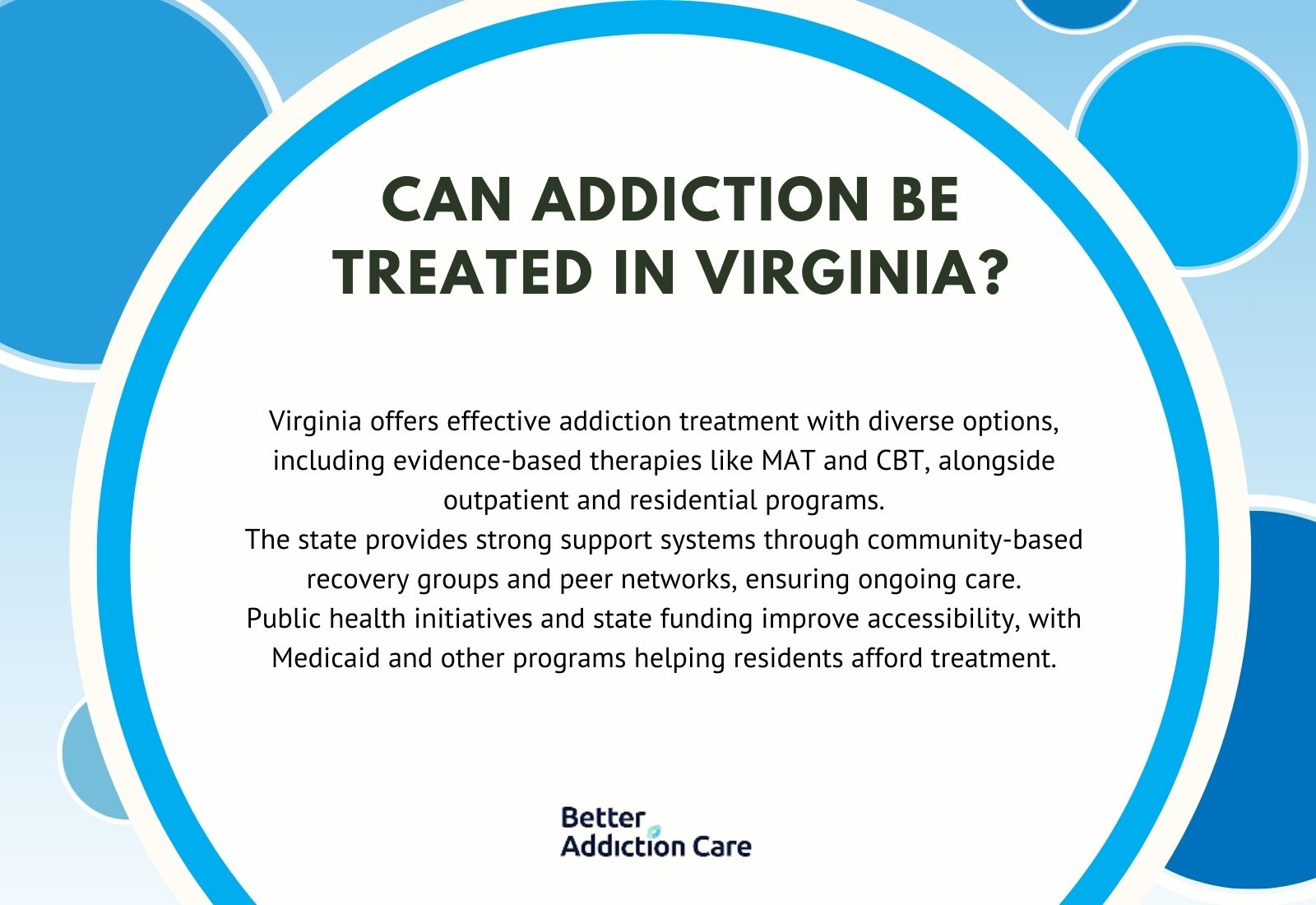
What is the state of Virginia?
The state of Virginia is in the United States located in the southeastern region of the country. It is bordered by Maryland and Washington, D.C. to the north, the Atlantic Ocean to the east, North Carolina to the south, Tennessee to the southwest, Kentucky to the west, and West Virginia to the northwest. Virginia has a population of 8.7 million people, with a fairly even gender distribution: 4.3 million males and 4.4 million females. Economically, Virginia is considered one of the wealthier states in the U.S., with a median household income of $96,490 as of 2024, placing it among the top 10 states in terms of wealth. Virginia has a diverse economy driven by sectors such as government, technology, agriculture, and tourism.
What is the population of Virginia?
The population of Virginia is 8.72 million people. The gender distribution is relatively balanced, with 4.29 million males, accounting for 49.2% of the population, and 4.43 million females, making up 50.8%. Age-wise, 1.88 million individuals, or 21.76%, are under 18 years old, while the majority, 5.37 million individuals or 62.23%, fall between the ages of 18 and 64. The population aged 65 years and over totals 1.38 million, representing 16.01% of Virginia's residents. These demographics highlight Virginia's diverse population structure by both gender and age.
What is the income of people from Virginia?
The income of people from Virginia is $73,841, per capita income. Virginia's median household income is $96,490, placing it among the top ten states in the U.S. for household income. Income levels in Virginia vary by age group. Householders aged 45 to 64 years have the highest median household income at $112,553, followed by those aged 25 to 44 years with an income of $98,593. Householders under 25 years old have a median income of $44,781, while those aged 65 years and over report a median income of $64,483. Gender disparities in income are evident in Virginia. The median income for all male workers aged 15 years and older is $52,426, whereas for female workers in the same age group, it is $34,720. These figures highlight the variations in income across different demographics within Virginia.
Local Rehabs in Virginia
Common Questions About Rehab in Virginia
Take a look at our FAQ. We've tried to fill it with all the answers you're looking for. And if not, contact us on (888) 349-0436.
You can check any rehab center accreditation by looking them up on the websites of reputable organizations such as Joint Commission Accreditation or the Commission on Accreditation of Rehabilitation Facilities (CARF). You can also check state licensing through the Virginia Department of Behavioral Health and Developmental Services.
When preparing for a stay at a rehab center, it's important to bring essential items that will support your comfort and recovery. Pack personal identification, insurance cards, and any necessary documentation, along with comfortable clothing for daily activities and sleep. Include basic toiletries like a toothbrush, shampoo, deodorant, and any prescribed medications in their original bottles. A notebook or journal can be helpful for reflection, and you may want to bring a few books or personal items for comfort. However, it's crucial to leave valuables, electronic devices, non-prescribed medications, and prohibited items like alcohol or sharp objects at home. Before packing, check with the rehab center for their specific guidelines on what to bring and what to leave behind.
Yes, family members can often be involved in the treatment process at many rehab centers. Family involvement is considered a crucial component of recovery, as it helps to address underlying issues, improve communication, and provide a support system for the individual in treatment. Many rehab programs offer family therapy sessions, educational workshops, and support groups designed to help family members understand addiction and learn how to support their loved one’s recovery.


